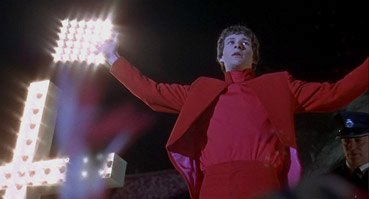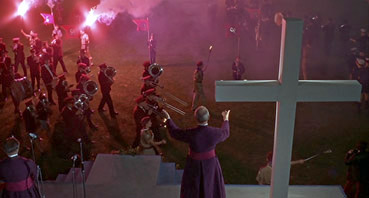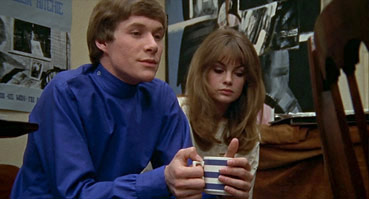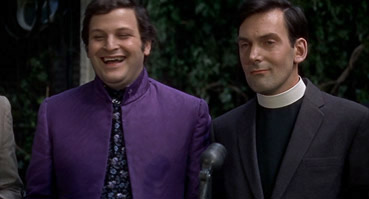|
Could we, as a nation, become slaves to a manufactured image? It's hard to imagine that the Britain of today could unify on any single issue or personality. One effect of post-Thatcherite self-interest has been that those with little or no knowledge of a subject are happy to dismiss even hard evidence presented in its name if it conflicts with their lifestyle, prejudices or business practices. But to get majority agreement on a single public figure, whether they be politician, singer, actor or TV personality, is surely unimaginable.
Or is it? On 31st August 1997 a car drove into the Pont de l'Alma road tunnel in Paris pursued by paparazzi photographers and crashed, killing three of its four occupants, one of whom was Diana Spencer, the Princess of Wales. Although nothing like as universal as many would have us believe, the outpouring of grief was so passionate and unquestioning that it effectively silenced all opposition – to publicly express an alternative opinion was to commit professional suicide and run the risk of physical assault or worse. And yet almost none of the grieving millions had ever met the woman and precious few knew her personally. They were grieving for an image, one created and promoted by the very media that those who bought into it then rounded on and accused of causing her death.

The cult of personality has been around for far longer, of course. What would any major religion be without its figureheads, iconic prophets or sons of God? It's here that the power to really unite a people under a single figure can be seen at its most terrifying. You can't reason with fanatics, and if they grow into a majority then the consequences of dissent can be truly dire. It's a similar story when individuals set themselves up as gods in human form, political leaders who attain positions of absolute authority that they are able to use to crush all opposing voices. The terrible irony is that, military coups aside, these figures are often brought to power on the backs of the adulation of those they later oppress.
Privilege, the first full-length theatrical feature from director Peter Watkins and the nearest he came to a mainstream movie (it was distributed by Rank in the UK and Universal in the US), explores how the cult of personality could be employed by those in power as a method of mass control. The setting is Britain in an unspecified near future – or a near future as imagined back in 1968, when silver was predicted to be the colour of choice for the young and fashion conscious – and the country, particularly its youth, is in the thrall of pop megastar Steven Shorter. His performances reduce women to hysteria and his violent stage show – based on his past experience of police brutality – are encouraged by the government as a release valve for pent-up youth aggression. But Shorter is becoming increasingly unhappy with his messianic status and the enforced responsibilities it brings, of a lifestyle designed and controlled by others. When the government decides that the time has come for an image switch to bring the youth of Britain under the moral control of the church, Shorter slides towards breaking point.
It's worth stating before I go any further that I regard Peter Watkins as one of the most important filmmakers this or any country has ever produced. His canon of work may be small, but includes a high proportion of bona fide masterpieces, including The War Game, Culloden, Punishment Park and Edvard Munch, the first of which pretty much defined the term drama-documentary and remains the standard to which all other works in the sub-genre are compared. Privilege is cut very much from the same cloth, a speculation on near-future events presented in documentary format, complete with hand-held observational camerawork, interviews with key characters, and Watkins' own soberly delivered voice-over. Even the stylistic use of recurring motifs – the striking concert billboard of Shorter with his hands outstretched is foreshadowed by photographs and posters from earlier in his career – plays like image branding and in no way disrupts the documentary feel.

But although every bit as critical and forward-looking as both The War Game and Punishment Park, time has not been quite as kind to Privilege as it has to its illustrious compadres, the victim of shifting musical tastes and predictions that, though sometimes unnervingly accurate, have been long since been overtaken by their real world equivalents. Modern musicians and their music have always been a problem for film drama, where a song that can change the world or a musician of unique talent is nigh-on impossible to realise without the participation of talent whose revelatory role in the narrative is effectively nullified by their pre-existing real-world fame. Yet to create a song from scratch that even a cynical audience will believe could launch its singer to international fame is a seriously tall order, given that this is exactly what pop groups have been trying to achieve since they first came into being. It was certainly beyond the reach of ex-Manfred Mann vocalist Paul Jones, whose self-penned songs here provide no real insight into the reasons for Shorter's phenomenal popularity. It's a similar story with his shock-tactic stage show, which feels a little anaemic when compared to the theatrical rock of the like of Alice Cooper, Kiss, GWAR and Marilyn Manson, and unworthy of the audience despair it provokes.
But while the surface dressing may have become a victim of changing times (and no period has suffered in this respect more than the late sixties), the film's underlying predictions are not only still relevant but from the distance of time can be seen as genuinely visionary. As defined here, Shorter is a one-man summation of the modern obsession with celebrity and its trappings, a media phenomenon whose every move would nowadays be reported and photographed in depth by Hello! magazine and who would appear in every TV ad break to plug everything from home insurance to toilet cleaner, which itself is foreseen in in the ludicrous in-film commercial for the Apple Marketing Board that Shorter lends his name and face to. That he becomes a propaganda tool for mass conversion to Christianity may also seem a little unlikely in an age in which atheism has become the new black (ironically Jones himself later to converted to the faith after attending an event by evangelist preacher Luis Palau at the invitation of a certain Cliff Richard*). But there are still plenty of religions out there with their eyes on the prize of world-wide allegiance, or alternatively you can substitute your own controlling ideology of choice – the current pursuit of personal wealth at the expense of community and social morality is my personal favourite – and the prophecy is still valid.

Where the film does lose out to its aforementioned brethren is in the urgency of its drama. This is partly due to the shallow emptiness of the lives it portrays and their social distance from our own everyday world, but the inexperience of the two leads also shows – Jones is unwaveringly glum throughout, while as artist and confidant Venessa Ritchie, fashion model Jean Shrimpton is about as expressive as of one of the shell-shocked radiation victims in The War Game. Yet it's when the two are alone together that the real Shorter, the man beneath the image, is momentarily able to surface, and it's here that Jones is at its most relaxed and natural, which was doubtless Watkins' intention, of course. The portrayal of Shorter's managerial entourage is engagingly satirical without straying too far from how you imagine such people probably operate, and gives rise to some of the film's few comical moments, a personal favourite being when excitable musical director and self-professed anarchist Freddie Kay passes judgement on the Lew Grade-like Uncle Julie's woeful attempt at song composition.
All of which makes for uneven but often fascinating viewing, a film trapped in time by its characters, fashions, music and decor, but uncannily accurate in many of its predictions. Watkins' disdain for organised religion and its practitioners is at its most blatant here, as his contempt for the machinations and dark deeds of government, welcome sentiments whose righteous anger tends to compensate for their sometimes unsubtle expression. It may have been overtaken by the real-life events it portrays and predicts, but it's important to see past the surface trappings and acknowledge just how ahead of the game Watkins was. It doesn't all work and is neither as consistently compelling or gut-punchingly powerful as the films for which Watkins is rightly revered, but it's still a bold, imaginative and impassioned warning of things to come, and a fascinating record of the late-60s mood change that saw Summer of Love idealism give way to protest, disillusion and mass discontent.
Transferred and restored in high definition from the original 35mm negative elements by Universal Pictures, the picture quality is very impressive, particularly in the consistency and tonal balance of its contrast, black levels that are maintained without sacrificing shadow detail, and a close to naturalistic colour range that resists any temptation to over-saturate the primes. There's also hardly a dust spot to be seen, though a small trace of picture jitter is visible in a couple of scenes. There are surprisingly few differences between the Blu-ray and the already available DVD, in part because of the quality of the DVD transfer – the BD image is slightly sharper, but not significantly so, though this could be down to a touch of edge enhancement, which is more visible on the DVD than on the Blu-ray.

A very clean 48K PCM mono track provides the picture with the sort of audio accompaniment it needs, with the music in particular having a brightness and clarity that outstrips even some bigger budgeted studio films of the period. A slightly narrowed dynamic range is to be expected, as is the lack of bass punch, but this is still something of pleasant surprise.
Note that the screen grabs here are from the DVD version as our Blu-ray capture has taken a (hopefully temporary) nose dive.
Diary of an Unknown Soldier (1959) (17:03)
Watkins' heartfelt anti-war sentiments are given poetic cinematic voice in this, his third short film as director, made when he was just 24-years old under the banner of the Canterbury-based Playcraft theatre group, of which he was a member. During the First World War, a young soldier contemplates his anxieties and fears about the conflict and his own fragile mortality as he waits with his comrades to go into battle. Shot mute with the soundtrack constructed from the noises of unseen battles and the title character's thoughts in voice-over, there's a clear Einstein influence on the use of facial close-ups, the symbolism and the rapid cutting of the film's most energised sequence, and the film as a whole is an object lesson in just what can be achieved with a handful of actors, a few costumes and single, muddy field location.
The Forgotten Faces (1961) (18:53)
The 1956 Hungarian revolution is the subject for this extraordinary faux-documentary, a virtual blueprint for the style Watkins was to hone for his subsequent TV and feature work. Almost all of the elements are here, including the hand-held documentary look, the identification of specific individuals by name, social characteristics and ultimate fate, the urgent and realistic explosions of violent conflict, and Watkins' signature, fact-based narration. The camera has even been very slightly under-cranked to emulate the accelerated look caused by incompatibility of shooting and projection speed that was once common with archive and newsreel footage. This, according a friend of mine who joined Playcraft between Forgotten Faces and Culloden, this was the film that brought Watkins to the attention of Huw Weldon and opened the door to the BBC.
Trailer (2:54)
A trailer of its time, one whose narration plays almost like parody, something the amusing suggestion that a contemptuous comment about the in-film director is actually directed at Watkins suggests it may well be.
Booklet
An essay on the film by Robert Murphy is the main feature of a typically fine BFI booklet, a detailed and interesting piece that in its enthusiastic support of the film does briefly confuse hindsight with contemporary comment. There's also a comprehensive biography of Peter Watkins by William Fowler, a piece on Paul Jones by Vic Pratt, another on Diary of an Unknown Soldier and Forgotten Faces by J. Milton Shulman, credits from the film, stills and poster artwork.
Although not my favourite Watkins film, there's so much that is bold and smart and forward-looking in Privilege that I'd still wholeheartedly recommend it, and if Watkins fans haven't already picked up the earlier DVD release then they should definitely get their hands on the Blu-ray, which has 1080p transfers not only of the main feature, but both of the short films and the trailer as well. And for all of the conflicting reasons above, this is perfect Watkins film for inclusion in the BFI's Flipside strand.
* http://en.wikipedia.org/wiki/Paul_Jones_(singer)
|